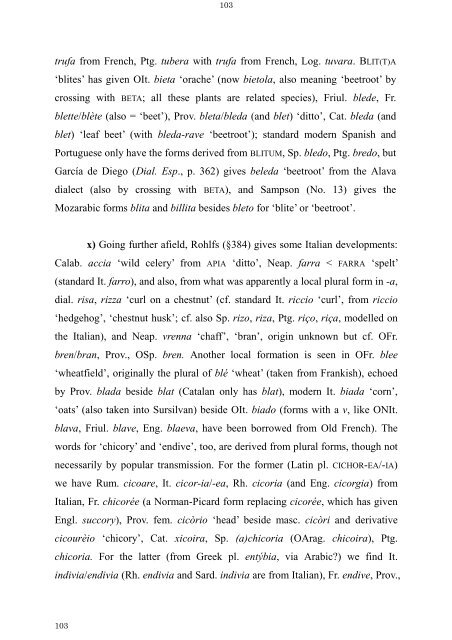The Latin Neuter Plurals in Romance - Page ON
The Latin Neuter Plurals in Romance - Page ON
The Latin Neuter Plurals in Romance - Page ON
You also want an ePaper? Increase the reach of your titles
YUMPU automatically turns print PDFs into web optimized ePapers that Google loves.
103<br />
103<br />
trufa from French, Ptg. tubera with trufa from French, Log. tuvara. BLIT(T)A<br />
‘blites’ has given OIt. bieta ‘orache’ (now bietola, also mean<strong>in</strong>g ‘beetroot’ by<br />
cross<strong>in</strong>g with BETA; all these plants are related species), Friul. blede, Fr.<br />
blette/blète (also = ‘beet’), Prov. bleta/bleda (and blet) ‘ditto’, Cat. bleda (and<br />
blet) ‘leaf beet’ (with bleda-rave ‘beetroot’); standard modern Spanish and<br />
Portuguese only have the forms derived from BLITUM, Sp. bledo, Ptg. bredo, but<br />
García de Diego (Dial. Esp., p. 362) gives beleda ‘beetroot’ from the Alava<br />
dialect (also by cross<strong>in</strong>g with BETA), and Sampson (No. 13) gives the<br />
Mozarabic forms blita and billita besides bleto for ‘blite’ or ‘beetroot’.<br />
x) Go<strong>in</strong>g further afield, Rohlfs (§384) gives some Italian developments:<br />
Calab. accia ‘wild celery’ from APIA ‘ditto’, Neap. farra < FARRA ‘spelt’<br />
(standard It. farro), and also, from what was apparently a local plural form <strong>in</strong> -a,<br />
dial. risa, rizza ‘curl on a chestnut’ (cf. standard It. riccio ‘curl’, from riccio<br />
‘hedgehog’, ‘chestnut husk’; cf. also Sp. rizo, riza, Ptg. riço, riça, modelled on<br />
the Italian), and Neap. vrenna ‘chaff’, ‘bran’, orig<strong>in</strong> unknown but cf. OFr.<br />
bren/bran, Prov., OSp. bren. Another local formation is seen <strong>in</strong> OFr. blee<br />
‘wheatfield’, orig<strong>in</strong>ally the plural of blé ‘wheat’ (taken from Frankish), echoed<br />
by Prov. blada beside blat (Catalan only has blat), modern It. biada ‘corn’,<br />
‘oats’ (also taken <strong>in</strong>to Sursilvan) beside OIt. biado (forms with a v, like <strong>ON</strong>It.<br />
blava, Friul. blave, Eng. blaeva, have been borrowed from Old French). <strong>The</strong><br />
words for ‘chicory’ and ‘endive’, too, are derived from plural forms, though not<br />
necessarily by popular transmission. For the former (<strong>Lat<strong>in</strong></strong> pl. CICHOR-EA/-IA)<br />
we have Rum. cicoare, It. cicor-ia/-ea, Rh. cicoria (and Eng. cicorgia) from<br />
Italian, Fr. chicorée (a Norman-Picard form replac<strong>in</strong>g cicorée, which has given<br />
Engl. succory), Prov. fem. cicòrio ‘head’ beside masc. cicòri and derivative<br />
cicourèio ‘chicory’, Cat. xicoira, Sp. (a)chicoria (OArag. chicoira), Ptg.<br />
chicoria. For the latter (from Greek pl. entýbia, via Arabic?) we f<strong>in</strong>d It.<br />
<strong>in</strong>divia/endivia (Rh. endivia and Sard. <strong>in</strong>divia are from Italian), Fr. endive, Prov.,









